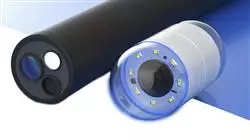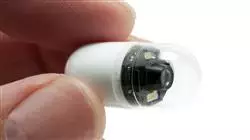University certificate
The world's largest faculty of medicine”
Introduction to the Program
Benefíciate de todas las ventajas que te ofrece este programa, adaptado a tus exigencias y estándares de calidad más altos”

El intestino delgado supone una zona del aparato digestivo de especial interés para todos los especialistas, pues se trata de una de las zonas donde las técnicas de exploración deben perfeccionarse continuamente para garantizar los mejores diagnósticos posibles. Esto implica que los métodos se renuevan de forma periódica, dada la dificultad de la zona para una evaluación óptima.
Este programa de TECH presenta los últimos avances en el uso de cápsulas endoscópicas, la Agile Patency para prevenir contraindicaciones y las enteroscopias de un balón, doble balón y en espiral. Además, el temario se complementa con los métodos más exitosos de diagnóstico y terapia alternativos a las técnicas endoscópicas.
Con todo ello, el especialista estará accediendo a una revisión completa de la metodología práctica más vanguardista y actualizada del panorama académico. Una oportunidad única para conocer los postulados científicos más recientes en el manejo de pólipos duodenales, lesiones periampulares y lesiones tumorales superficiales.
Además, la titulación cuenta con la gran ventaja de impartirse de forma completamente online, sin horarios ni ataduras de ningún tipo. El temario se encuentra disponible para su descarga desde el primer día, siendo el especialista el que decide cuándo estudiarlo. Esto permite compaginar la alta labor profesional con una forma de actualización innovadora en el ámbito académico.
Por otro lado, el Postgraduate certificate integra una exclusiva y exhaustiva Masterclass que recoge los principales avances de la Endoscopia Oncológica y la Gastroenterología. Todo ello bajo las directrices de un especialista de amplio perfil profesional y prestigio que se desempeña como Director Invitado en este programa.
Capacítate de manera teórico-práctica con los disruptivos contenidos que el Director Invitado Internacional de este programa abordará mediante la más exclusiva Masterclass”
Este Postgraduate certificate en Endoscopic Capsule contiene el programa universitario más completo y actualizado del mercado. Sus características más destacadas son:
- El desarrollo de casos prácticos presentados por expertos en Endoscopias Oncológicas
- Los contenidos gráficos, esquemáticos y eminentemente prácticos con los que está concebido recogen una información científica y práctica sobre aquellas disciplinas indispensables para el ejercicio profesional
- Los ejercicios prácticos donde realizar el proceso de autoevaluación para mejorar el aprendizaje
- Su especial hincapié en metodologías innovadoras
- Las lecciones teóricas, preguntas al experto, foros de discusión de temas controvertidos y trabajos de reflexión individual
- La disponibilidad de acceso a los contenidos desde cualquier dispositivo fijo o portátil con conexión a internet
Los mejores especialistas del aparato digestivo han aunado en este programa la mejor actualización científica en temas de urgencia como los linfomas intestinales o los síndromes hereditarios”
El programa incluye, en su cuadro docente, a profesionales del sector que vierten en esta capacitación la experiencia de su trabajo, además de reconocidos especialistas de sociedades de referencia y universidades de prestigio.
Su contenido multimedia, elaborado con la última tecnología educativa, permitirá al profesional un aprendizaje situado y contextual, es decir, un entorno simulado que proporcionará una capacitación inmersiva programada para entrenarse ante situaciones reales.
El diseño de este programa se centra en el Aprendizaje Basado en Problemas, mediante el cual el profesional deberá tratar de resolver las distintas situaciones de práctica profesional que se le planteen a lo largo del curso académico. Para ello, contará con la ayuda de un novedoso sistema de vídeo interactivo realizado por reconocidos expertos.
Encontrarás resúmenes interactivos y una gran cantidad de material audiovisual que complementará tu actualización en las patologías oncológicas del intestino delgado"

Conocerás las últimas novedades en contraindicaciones de la cápsula endoscópica y como solventarlas con el uso de la Agile Patency"
Why study at TECH?
TECH is the world’s largest online university. With an impressive catalog of more than 14,000 university programs available in 11 languages, it is positioned as a leader in employability, with a 99% job placement rate. In addition, it relies on an enormous faculty of more than 6,000 professors of the highest international renown.

Study at the world's largest online university and guarantee your professional success. The future starts at TECH”
The world’s best online university according to FORBES
The prestigious Forbes magazine, specialized in business and finance, has highlighted TECH as “the world's best online university” This is what they have recently stated in an article in their digital edition in which they echo the success story of this institution, “thanks to the academic offer it provides, the selection of its teaching staff, and an innovative learning method aimed at educating the professionals of the future”
A revolutionary study method, a cutting-edge faculty and a practical focus: the key to TECH's success.
The most complete study plans on the university scene
TECH offers the most complete study plans on the university scene, with syllabuses that cover fundamental concepts and, at the same time, the main scientific advances in their specific scientific areas. In addition, these programs are continuously being updated to guarantee students the academic vanguard and the most in-demand professional skills. In this way, the university's qualifications provide its graduates with a significant advantage to propel their careers to success.
TECH offers the most comprehensive and intensive study plans on the current university scene.
A world-class teaching staff
TECH's teaching staff is made up of more than 6,000 professors with the highest international recognition. Professors, researchers and top executives of multinational companies, including Isaiah Covington, performance coach of the Boston Celtics; Magda Romanska, principal investigator at Harvard MetaLAB; Ignacio Wistumba, chairman of the department of translational molecular pathology at MD Anderson Cancer Center; and D.W. Pine, creative director of TIME magazine, among others.
Internationally renowned experts, specialized in different branches of Health, Technology, Communication and Business, form part of the TECH faculty.
A unique learning method
TECH is the first university to use Relearning in all its programs. It is the best online learning methodology, accredited with international teaching quality certifications, provided by prestigious educational agencies. In addition, this disruptive educational model is complemented with the “Case Method”, thereby setting up a unique online teaching strategy. Innovative teaching resources are also implemented, including detailed videos, infographics and interactive summaries.
TECH combines Relearning and the Case Method in all its university programs to guarantee excellent theoretical and practical learning, studying whenever and wherever you want.
The world's largest online university
TECH is the world’s largest online university. We are the largest educational institution, with the best and widest online educational catalog, one hundred percent online and covering the vast majority of areas of knowledge. We offer a large selection of our own degrees and accredited online undergraduate and postgraduate degrees. In total, more than 14,000 university degrees, in eleven different languages, make us the largest educational largest in the world.
TECH has the world's most extensive catalog of academic and official programs, available in more than 11 languages.
Google Premier Partner
The American technology giant has awarded TECH the Google Google Premier Partner badge. This award, which is only available to 3% of the world's companies, highlights the efficient, flexible and tailored experience that this university provides to students. The recognition as a Google Premier Partner not only accredits the maximum rigor, performance and investment in TECH's digital infrastructures, but also places this university as one of the world's leading technology companies.
Google has positioned TECH in the top 3% of the world's most important technology companies by awarding it its Google Premier Partner badge.
The official online university of the NBA
TECH is the official online university of the NBA. Thanks to our agreement with the biggest league in basketball, we offer our students exclusive university programs, as well as a wide variety of educational resources focused on the business of the league and other areas of the sports industry. Each program is made up of a uniquely designed syllabus and features exceptional guest hosts: professionals with a distinguished sports background who will offer their expertise on the most relevant topics.
TECH has been selected by the NBA, the world's top basketball league, as its official online university.
The top-rated university by its students
Students have positioned TECH as the world's top-rated university on the main review websites, with a highest rating of 4.9 out of 5, obtained from more than 1,000 reviews. These results consolidate TECH as the benchmark university institution at an international level, reflecting the excellence and positive impact of its educational model.” reflecting the excellence and positive impact of its educational model.”
TECH is the world’s top-rated university by its students.
Leaders in employability
TECH has managed to become the leading university in employability. 99% of its students obtain jobs in the academic field they have studied, within one year of completing any of the university's programs. A similar number achieve immediate career enhancement. All this thanks to a study methodology that bases its effectiveness on the acquisition of practical skills, which are absolutely necessary for professional development.
99% of TECH graduates find a job within a year of completing their studies.
Postgraduate Certificate in Endoscopic Capsule
The capsule endoscope is a small capsule-shaped device that is easily swallowed and used for the diagnosis and evaluation of diseases in the intestinal tract. The capsule endoscope is equipped with a small video camera, a light source and electromagnetic signal transmitters that allow the capture of detailed images of the small intestine.
The capsule is about the size of a pill and is swallowed with water, just like any other medication. The capsule moves through the intestinal tract, transmitting video images to an external recorder worn on a belt. The images obtained as the capsule moves through the small intestine are analyzed by a gastroenterologist to determine the presence of disease with high diagnostic accuracy.
Capsule endoscopy is often used for the diagnosis of gastrointestinal diseases such as Crohn's disease, celiac disease, irritable bowel syndrome and nutrient malabsorption. It can also be useful in the detection of tumors and lesions in the small intestine.
Capsule endoscopy is a noninvasive alternative to other endoscopic procedures, such as colonoscopy and small bowel obstructive endoscopy. Although safe and effective, capsule endoscopy may not be suitable for all patients and it is important to discuss the risks and benefits of this procedure with your treating physician.
Upon completion of the Postgraduate Certificate, students will be able to understand the principles and technique of capsule endoscopy, proper patient preparation and management, identification and evaluation of gastrointestinal diseases and their treatment using capsule endoscopy. This will enable them to work in hospitals and health care facilities that use capsule endoscopy as part of their diagnostic and treatment protocol.







